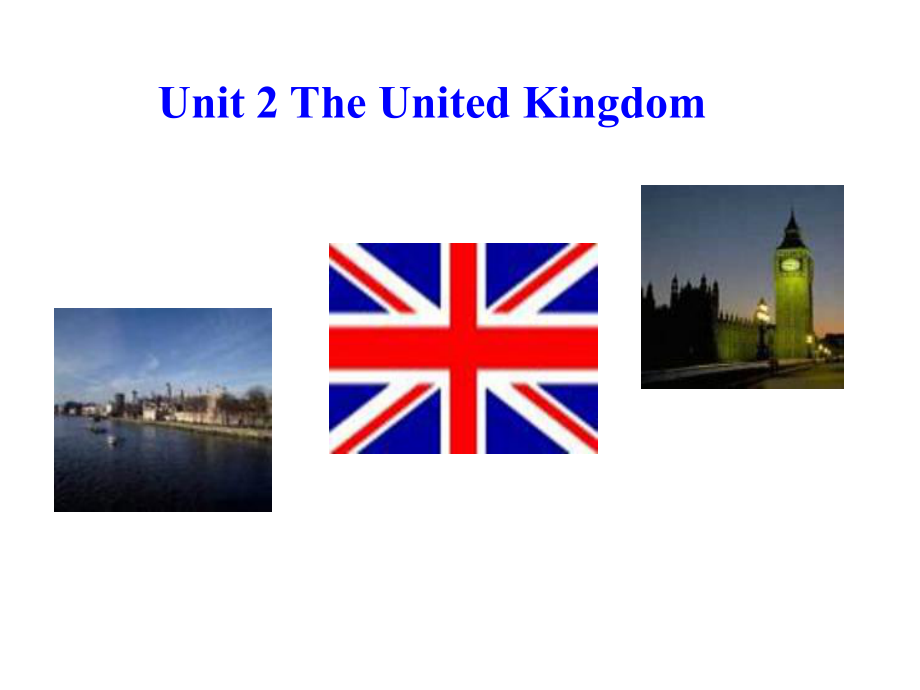《新人教版高中英語(yǔ)必修5《Unit 2 The United Kingdom》課件》由會(huì)員分享�,可在線(xiàn)閱讀,更多相關(guān)《新人教版高中英語(yǔ)必修5《Unit 2 The United Kingdom》課件(27頁(yè)珍藏版)》請(qǐng)?jiān)谘b配圖網(wǎng)上搜索�。
1、Unit 2 The United KingdomThe first period Have you ever heard of Guy Fawkes Night? What do you want to know about it? It is celebrated in Britain on November 5th. People will have firework parties and burn cloth dolls of Guy Fawkes on a bonfire. In the 17th century, there were two kinds of Christian
2����、 in Europe, Catholic and Protestant, and they were often at war with each other. Guy Fawkes was a Catholic, but the government of England usually supported Protestant. So Fawkes and his Catholic friends decided to blow up the Houses of Parliament and kill King James. But before they could do anythin
3��、g, their plan was discovered. Guy Fawkes was caught and killed. And King James made November 5th into a yearly celebration so that people will not forget this “disaster”. Make up a dialogue betweenFawkes and Catesby F: How can we enter the Houses of Parliament? C: Maybe we can buy a house close to i
4����、t. These days houses usually have cellars. If we get the cellars connected with the Houses of Parliament, it will be convenient for us to get into it. F: Good idea! Then we can store a lot of gunpowder in the cellar. When the king and his advisers are in the Parliament for a meeting on November 6th,
5����、 we will light the gunpowder to start the fire. C: Thats it. Lets go to look for such a house at once. We dont have much time left. F: I agree with you. Lets go.True or false statements: ( ) 1. King James was a Catholic. ( ) 2. King James was frightened of Catholics. ( ) 3. King James supported Prot
6、estants. ( ) 4. He punished Guy Fawkes. ( ) 5. Guy Fawkes talked to King James.True or false statements: ( ) 6. The king thought the Catholics wanted to kill him. ( ) 7. The king rewarded Guy Fawkes. ( ) 8. The king thought there were too few Catholics. ( ) 9. The kings friends abroad were Protestan
7�、ts. The second periodKing Edward King Edward V(the son of Edward IV)King Richard (the uncle of Edward V)King Henry h i s son his daughter Maryhis daughterElizabeth The Tower of LondonCan such a royal palace be a prison? Who had been prisoners in it? King Edward V and his brother, Elizabeth IA. These
8、 two princes were _ and _ six hundred years ago. They had come to London for the older brother to be crowned _ after his father, King Edward IV, _. He was only thirteen years old. His wicked uncle, Richard, was supposed to _them both, but instead he had them _ while they were _.B. In the 1550s when
9����、queen Elizabeth I was still a _, her sister, Queen Mary, brought her to the Tower as a _ because she thought Elizabeth was a traitor. She _ through a special gate _“Traitors Gate”. That only _to very bad people. brothers, lived, King, died, look after, killed, asleep, princess, prisoner, went in, ca
10、lled, happened Places to visit/seeThe Tower of London St Pauls Cathedral Westminster Abby Big Ben Buckingham Palace Greenwich Karl Marxs statue The British Museum CommentsBuckingham PalaceSt Pauls Cathedral The third periodCross of St George (England) Cross of St Patrick (Ireland)Cross of St Andrew
11�����、(Scotland) Union Jack or Union FlagMain idea of each part: Part 1 (Para 1-Para 4) :How the UK developed into 4 countries. Part 2 (Para 5): Division of England into 3 zones, which have different characteristics. Part 3 (Para 6) :Culture and history of London. Language points 1. consist of be made up
12����、of 由由組成組成 (沒(méi)有進(jìn)行時(shí))沒(méi)有進(jìn)行時(shí)) 2. separate . from 把聯(lián)合在一起或靠近把聯(lián)合在一起或靠近的人或物分離出來(lái)的人或物分離出來(lái)divide.into把整體分為若干部分把整體分為若干部分3. break away (from sb / sth) 脫離;破除脫離���;破除4. convenience: n.方便��;便利方便��;便利 convenient: adj.5. attraction n. attract v. attractive adj. unattractive adj. attractively adv. 6. influence The Fourth Perio
13��、d一���、作賓語(yǔ)補(bǔ)足語(yǔ)的過(guò)去分詞與賓語(yǔ)之間的關(guān)系一、作賓語(yǔ)補(bǔ)足語(yǔ)的過(guò)去分詞與賓語(yǔ)之間的關(guān)系 1. 及物動(dòng)詞(短語(yǔ))的過(guò)去分詞用作賓語(yǔ)補(bǔ)足語(yǔ)時(shí)���,及物動(dòng)詞(短語(yǔ))的過(guò)去分詞用作賓語(yǔ)補(bǔ)足語(yǔ)時(shí)�����,賓語(yǔ)即是過(guò)去分詞的邏輯賓語(yǔ)��,賓語(yǔ)和過(guò)去分詞賓語(yǔ)即是過(guò)去分詞的邏輯賓語(yǔ)���,賓語(yǔ)和過(guò)去分詞之間存在邏輯上的被動(dòng)關(guān)系。之間存在邏輯上的被動(dòng)關(guān)系��。 2. 少數(shù)不及物動(dòng)詞如少數(shù)不及物動(dòng)詞如 go, change, fall 等的過(guò)去分詞等的過(guò)去分詞作賓語(yǔ)補(bǔ)足語(yǔ)時(shí)��,僅表示動(dòng)作完成�����。作賓語(yǔ)補(bǔ)足語(yǔ)時(shí),僅表示動(dòng)作完成���。3. 動(dòng)詞動(dòng)詞 seat, hide, dress 等的過(guò)去分詞作賓語(yǔ)補(bǔ)足語(yǔ)等的過(guò)去分詞作賓語(yǔ)補(bǔ)足語(yǔ)一般表示狀語(yǔ)而不表
14�����、示被動(dòng)的意義���。一般表示狀語(yǔ)而不表示被動(dòng)的意義。二�����、需用過(guò)去分詞作賓語(yǔ)補(bǔ)足語(yǔ)的情況二��、需用過(guò)去分詞作賓語(yǔ)補(bǔ)足語(yǔ)的情況1. 表示表示“意欲�����;命令意欲���;命令”的動(dòng)詞如的動(dòng)詞如 like, want, wish, order 等等2. 感官動(dòng)詞感官動(dòng)詞 see, hear, notice, observe, watch, feel, find 等等3. 使役動(dòng)詞使役動(dòng)詞 have, get, make, leave, keep 等等4. “with 賓語(yǔ)過(guò)去分詞賓語(yǔ)過(guò)去分詞”結(jié)構(gòu)中�,過(guò)去結(jié)構(gòu)中,過(guò)去分詞用作介詞分詞用作介詞 with 的賓語(yǔ)補(bǔ)足語(yǔ)�����。的賓語(yǔ)補(bǔ)足語(yǔ)�。 三、掌握三��、掌握“使役動(dòng)詞使役動(dòng)詞 h
15�、ave + 賓語(yǔ)過(guò)去分詞賓語(yǔ)過(guò)去分詞”的幾種含義的幾種含義1. 意為意為“主語(yǔ)請(qǐng)別人做某事主語(yǔ)請(qǐng)別人做某事”�����。 2. 意為意為“主語(yǔ)遭遇�����、遭受某一不愉快�、不測(cè)主語(yǔ)遭遇、遭受某一不愉快���、不測(cè)的事情的事情”����。 3. 意為意為“使完成某事使完成某事”,事情既可以是別人����,事情既可以是別人做完,也可以由主語(yǔ)參與完成�。做完,也可以由主語(yǔ)參與完成��。 四�����、區(qū)分過(guò)去分詞作賓語(yǔ)補(bǔ)足語(yǔ)與現(xiàn)在分詞四�����、區(qū)分過(guò)去分詞作賓語(yǔ)補(bǔ)足語(yǔ)與現(xiàn)在分詞作賓語(yǔ)補(bǔ)足語(yǔ)作賓語(yǔ)補(bǔ)足語(yǔ)一般說(shuō)來(lái)�����,過(guò)去分詞作賓語(yǔ)補(bǔ)足語(yǔ)時(shí)�����,賓語(yǔ)一般說(shuō)來(lái),過(guò)去分詞作賓語(yǔ)補(bǔ)足語(yǔ)時(shí)�����,賓語(yǔ)是動(dòng)作的承受者�����;現(xiàn)在分詞作賓語(yǔ)補(bǔ)足語(yǔ)是動(dòng)作的承受者��;現(xiàn)在分詞作賓語(yǔ)補(bǔ)足語(yǔ)時(shí)賓語(yǔ)是動(dòng)作的
16����、執(zhí)行者。試比較:時(shí)賓語(yǔ)是動(dòng)作的執(zhí)行者���。試比較: I found him lying on the grass just now. 我我剛才發(fā)現(xiàn)他躺在草坪上。剛才發(fā)現(xiàn)他躺在草坪上�����。 I found him knocked down by a car. 我看到我看到他被車(chē)撞了��。他被車(chē)撞了�����。The fifth periodPresentation: Present what you have discovered about the United Kingdom.WritingIntroduce a historical or a culturalsite in your hometown to s
17、ome foreigners who have come to your hometown for the first time. You should write in an exciting way.Show the Ss some well-written passages or beautiful sentences for them to appreciate.Self-assessmentI have learned _ well.A. Guy Fawkes NightB. Some stories that happened in the Tower of LondonC. Some interesting places to visit in LondonD. The history of the UKE. How to use the past participle as the object complementF. Some useful words and expressions
 新人教版高中英語(yǔ)必修5《Unit 2 The United Kingdom》課件
新人教版高中英語(yǔ)必修5《Unit 2 The United Kingdom》課件

